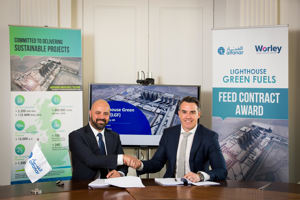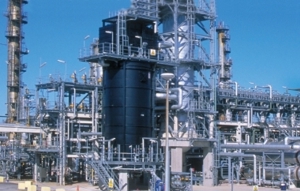The downstream rundown: In case you missed it
The downstream rundown: In case you missed it 6/3
In case you missed any downstream news, this piece will give you a summary of some of the top stories from last week.
JGC wins lion’s share of work in Saudi Aramco’s strategic Zuluf oil and gas field development megaproject
JGC Corporation and JGC Arabia have been jointly awarded a pair of contracts by Saudi Aramco for the Zuluf oil and gas field development megaproject.
Indrajit Sen, Oil & Gas Editor at GlobalData’s MEED, offers his view: “The Zuluf production increment project is of critical importance to Saudi Aramco in its quest of attaining a maximum oil production capacity of 13 MMbpd by 2027. Aramco has allocated a capital expenditure (capex) budget of $40 billion to $50 billion for 2022, and spending on the Zuluf EPC contracts accounts for a major chunk of this capex plan.
Topsoe technology to support Cresta’s renewable diesel and SAF production in Canada. Cresta has chosen Topsoe’s HydroFlex solution for revamping the Braya Renewable Fuels refinery in Newfoundland, Canada. The refinery will produce up to 18,000 bpd of Renewable Diesel and SAF initially and the capacity will increase further in various stages of expansion. The startup of the site for production of renewable fuels is expected in second half of 2022.
Neste teams up with Circularise to increase visibility along circular polymers and chemicals value chains
Neste and Netherlands-based startup Circularise have announced a partnership to bring Circularise’s traceability software into circular polymers and chemicals supply chains. The companies are collaborating in establishing digital solutions to trace renewable and recycled material flows, providing increased transparency along the value chain.
The companies will use Circularise’s blockchain-based supply chain traceability software, which creates a digital twin for the physical material. The twin stores information on the used materials throughout the value chain, enabling all value chain parties to keep track of the material. This allows them to verify where materials come from and how and where they were processed. The digital twin can also provide information on sustainability data such as the carbon footprint of the materials or products made from them.
BASF Bioenergy launches its new brand Spartec
BASF Bioenergy launches its new brand Spartec for the North American bioethanol market. With the new brand, BASF establishes a new standard for performance and service.
“The new brand Spartec demonstrates our commitment to addressing key customer needs such as improving plant performance by increasing yields, improving plant efficiency, and reducing carbon intensity,” says Danielle Cusumano, Head of Bioenergy Business, BASF Enzymes.
Worley to work with Heartwell on a greenfield renewable diesel plant
Worley has been awarded a contract by Heartwell Renewables LLC, a joint venture between The Love’s Family of Companies and Cargill, for a greenfield renewable fuels plant in Hastings, Nebraska.
The new plant will produce an estimated 80 MM gallons (around 303 MM liters) of renewable diesel per year from feedstocks such as vegetable oils and tallow.
Worley wins contract for Alfanar’s Lighthouse Green Fuels project in North East of England
Worley has been awarded a front-end engineering and design (FEED) services contract by Alfanar for a low-carbon fuels project in Teesside, United Kingdom.
The project, known as Lighthouse Green Fuels, will convert residual solid waste into SAF and green naphtha. The project will process approximately 1 MM tons of residual solid waste every year – such as municipal solid waste, refuse-derived fuel or solid recovered fuel – into approximately 3,200 bbl/day of SAF and green naphtha. These fuels have the potential to produce 80 percent fewer greenhouse gas emissions compared to current fossil fuels.
Linde Engineering to extend Slovnaft’s polypropylene capacity in Slovakia
Linde Engineering announced it has been selected by Slovnaft, a member of the MOL Group, a leading integrated Central Eastern European oil and gas corporation, to conduct a complex large-scale revamp of a polypropylene (PP3) plant in Bratislava, Slovakia.
The revamp will extend the plant’s capacity by 18 percent to 300 kilotons of polypropylene per year, and the storage facility will be expanded from the current 45 to 61 silos in total. The revamped plant has been designed to offer a higher degree of operational flexibility by producing multiple product grades and utilizing intermediate storage to ensure just-in-time production.
Phillips 66 taps FreeWire Technologies to support its first EV charging program in U.S.
Phillips 66 signed a letter of intent with FreeWire Technologies in support of its first electric-vehicle charging program in the United States, the two companies announced.
The announcement highlights Phillips 66’s commitment to pursue lower-carbon solutions and comes as an endorsement of FreeWire’s ultrafast, battery-integrated charging technology. The two companies will explore opportunities to deploy FreeWire’s technology within Phillips 66’s U.S. fueling stations and other strategic locations.
Technip Energies selected by IVERSON eFuels for a green ammonia production project
Technip Energies has been selected by IVERSON eFuels AS, a Special Purpose Vehicle between CIP, Hy2gen and Trafigura, to perform the engineering design of a complete green ammonia plant at Sauda, Rogaland, Norway.
The phase 1 of the project includes a green ammonia plant including utilities, offsites and electrical substation connected to the existing power grid, and pipeline, ammonia storage and offloading system.
KNOC to focus on energy security, push cleaner fuels goal
South Korea's state-run Korea National Oil Corp (KNOC) is looking to secure more oil and gas, while stepping up energy transition efforts to become carbon neutral by 2030, its CEO said.
The Asian country is the world's fourth-largest oil importer after China, India and Japan, importing nearly all of the 2.58 MMbpd it used in 2020, according to KNOC data. With global energy markets in a flux after Russia's February invasion of Ukraine, energy security has become a pressing issue for KNOC and other national oil companies.









Comments